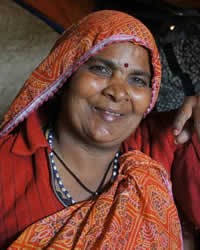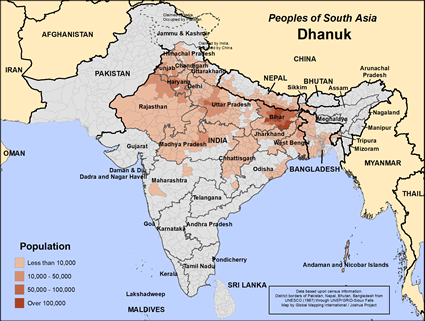The Dhanuks who are settled in northern India are either low caste or a minority indigenous people. Dhanuks are also called Rajbanshis. Smaller groups of Dhanuks are found in Bangladesh and Nepal. The main language of the Dhanuks is Hindi.
The language and culture of the Dhanuks are like that of the Tharus. The Dhanuks, like Tharus, are employed by landlords and well-to-do persons in private households and farms. Dhanuks do not marry within the clan, nor do they have the practice of cross-cousin marriage. In most cases the parents seek a spouse for their child. Due to the influence of neighbors, they also have the dowry system which involves the bride's family bringing a certain amount of wealth into the new family or to the groom's family. Those who do not abide by rules are expelled from the ethnic group.
Since the Dhanuks dwell in the river basins and the edges of forests, they fish and raise livestock. Some Dhanuks are even big landowners while others are landless. Many earn their livelihood by working as agriculture laborers and household servants. The houses of Dhanuks are plastered with mud.
Almost all Dhanuk practice Hinduism, the ancient religion of India. They worship and serve the gods of the Hindu pantheon. Hindus believe that by performing rituals and good works that they will attain "moksha" or freedom from the endless cycle of birth, death and rebirth. The Dhanuk visit Hindu temples and offer prayers, food, flowers, and incense to their gods in hopes of gaining protection and benefits. They do not have a personal or familial relationship with their gods as Christians do. There are many forms of Hinduism, each with its own deities and beliefs. The main yearly holidays of the Dhanuk people are Holi, the festival of colors and the start of spring, Diwali, the festival of lights, Navratri, the celebration of autumn and Rama Navami, Rama's birthday. In some places Brahmins are appointed as priests while in other places they use their own priests.
They are divided into two groups in terms of religion: those who worship the Hindu goddess Kali are called Kaliyaha and others are called Maharkhiya. Those who worship Kali eat pork and drink alcohol, whereas Maharkhiyas do not do so. They also worship a goddess called Gahil, who is one of five sisters. Their other goddesses are Shitalmata and Goureya Gaiya. Like other tribes they have their own rites of birth, death and marriage. The pregnant woman is kept in a separate home to arrange assistance from a midwife of the Chamar community. They believe they drive ghosts away by putting the branches of jujube and unwanted shoes at the main gate of the house. They give the newborn baby goat milk to drink. Dhanuks believe in magic, witchcraft and ghosts. Today there are several churches and several believers among them.
The Dhanuk would benefit from job training and access to modern medicine.
Pray for a spiritual hunger that will give the Dhanuk people a willingness to receive the blessings of Jesus Christ.
Pray for Dhanuk disciples who will make more disciples.
Pray for the Lord to send out workers to the Dhanuk people to tell them about Jesus.
Scripture Prayers for the Dhanuk in India.
| Profile Source: Joshua Project |











